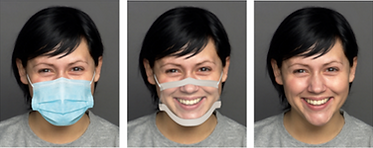Media Coverage of Our Work
Watch
Instagram Filters and Photoshop May Have Unintended Effects
Watch the TV segment below covering our research on how we perceive those who edit their photos online.
From surgical masks to niqabs: How different face coverings influence judgments.
Dr. McCrackin presents our recent work exploring whether the type of face occlusion matters in social interactions. Click to watch below.
Purposeful Empathy Podcast
Collaborator Dr. Jelena Ristic discusses our work on how face perception is altered by face occlusion on the Anita Nowak’s show Purposeful Empathy. Click here to listen on Spotify or watch below.
Listen
Photo Editing Could have Unintended Consequences
Dr. McCrackin discusses her recent work showing that photo editing can impact our perception of the photo poster on Montreal Now. Click below to listen in.
Face masks and emotion recognition.
Dr. McCrackin chatted with CKCU-FM about how face masks impact emotion recognition for the Midweek Radio show. Click here for the full show or press play below to just hear Dr. McCrackin's segment.
How wearing a mask has altered the communication of emotions.
Comment le port du masque a altéré la communication des émotions.
Collaborator Florence Mayrand discusses how face masks impact our ability to communicate emotional states for Radio Canada's Segment, “Dans la Mosaique”. Click here or press play below to listen in.
Does wearing a mask interfere with nonverbal communication?
Est-ce que le port du masque nuit à la communication non-verbale?
Collaborator Florence Mayrand discusses our recent work on perception of masked faces for Radio Canada's Segment, “Junction-11-17” Click here or press play below to hear what Florence has to say.
What emotions are hidden by the mask?
Quelle émotions sont cachées par le masque?
Our collaborator Florence Mayrand completed a
french Radio interview with Radio Canada for the segment “It’s Never the Same” (C’est Jamais Pareil), discussing how emotion recognition is affected by lower face occlusion. Click here or press play below to listen.
Read
New research shows masks make it more difficult to read emotions from faces.
Read Dr. McCrackin's interview about our work on face masks and emotion recognition for the popular psychology blog PsyPost.org.
Face Masks impede communication.
Read the written coverage of our face mask work by the Suburban, Quebec's largest newspaper.
What's going on behind that face mask?
Read the coverage of our research on face occlusion featured on Research2Reality, a science knowledge translation site.
Face masks impair nonverbal communication between individuals.
Read Dr. McCrackin's interview about our work on face masks and nonverbal communication for the McGill newsroom.
Transparent face masks restore emotional understanding, but not empathy.
Read Dr. McCrackin's interview with the McGill newsroom about how transparent face masks may restore some, but not all, social functioning.
Our brains can communicate wordlessly, through our eyes.
Read the recent interview about our work on how extremely sensitive we can be to changes in eye-gaze that vary with intentional states.
People really can communicate with just their eyes, study finds.
Check out the recent interview about our work on LiveScience.com demonstrating that glances can transmit information about one’s mental state to others.
Follow my gaze - A new study reveals how eyes can replace words in communicating with others.
Check out the recent Atlantico interview about our paper demonstrating that observers are sensitive to subtle differences in eye motion associated with different mental states.
.png)







